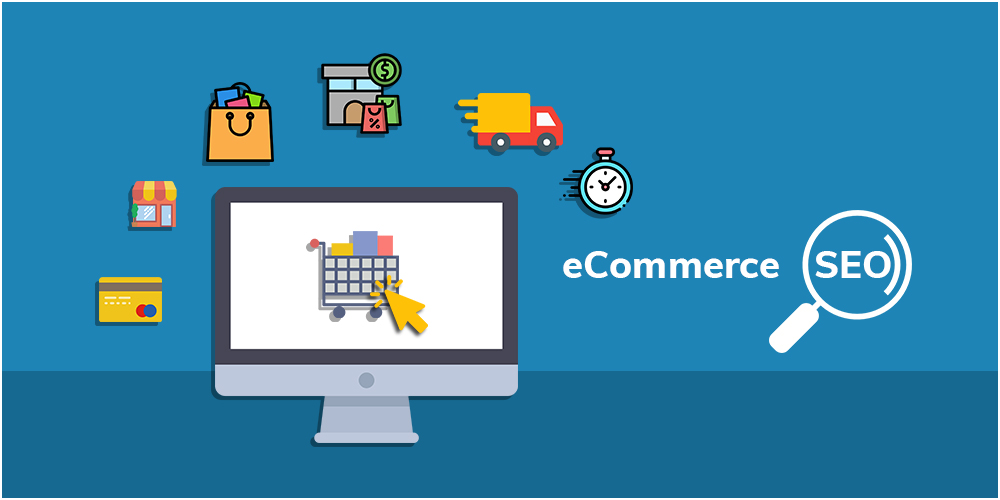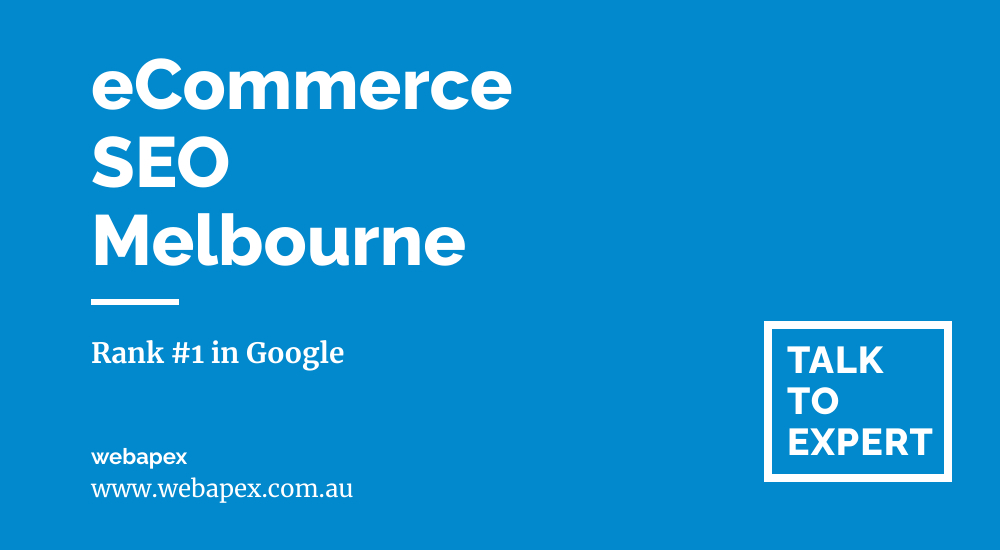eCommerce SEO Melbourne, Best eCommerce SEO Sydney
Best eCommerce SEO Company in Melbourne, Sydney, Brisbane, Perth and Adelaide

eCommerce SEO Melbourne
SEO is an integral part of any business in Australia. Whether you are a startup or an existing eCommerce online store, you would need a strong online presence to stand out in the crowd. We have made eCommerce SEO Melbourne easy with our powerful and holistic on-site and off-site strategies. Need to increase eCommerce sales? Get a professional eCommerce website design with top-level SEO consideration by webapex.
SEO is not an easy task if you are looking for long-term sustainable results and the difficulty level increases significantly for an eCommerce website as they require ranking for a diverse range of keywords.
We also specialise in website SEO migration, if you are planning to change or upgrade your eCommerce platform and need expert-level planning to retain your ranking then we can help. Also, visit our website migration checklist page to learn more.
If you are looking for a trusted SEO consultant in Melbourne then look no further, call us today to discuss your requirement. We also provide SEO in Geelong and other parts of Australia.

It is critical for the eCommerce website to be SEO optimised from the ground up with the best practices like
- A well-designed website with easy navigation.
- A website that can be accessed easily using Mobile as well as desktop.
- Highest consideration of on-site SEO and internal linking strategy.
- A very powerful natural linking strategy is a very challenging task.
- A process where the data-driven decision is possible through the website.
Not many eCommerce SEO agencies in Melbourne can deliver quality results as we do. We are known for providing safe search engine optimisation service which comes with strategic planning and expert guide to our SEO copywriting Melbourne team.
Having an eCommerce website without SEO is all about leaving the opportunity to boost sales. Data analysis have shown that any website that appears higher on search results receives more click and thus the business revenue increases. Talk to webapex eCommerce ranking SEO experts, we are known for producing amazing results for customers with an 'out of the box' thinking process. We also provide an SEO Geelong company, enquire today and book the first free phone consultation.
eCommerce SEO Agency Sydney
If you are an eCommerce business located in Sydney and looking for a reliable SEO partner then you should talk to us, we go above and beyond the unconventional method of doing search engine optimisation.
We have worked with businesses across Australia to lift their eCommerce SEO ranking to realise their potential.
eCommerce SEO Sydney projects are no different for us.
A company with a very unique approach to doing SEO:
- We do not work on any project, we really like to bring a difference to the business and its revenue.
- We only work with serious businesses who can work with us in a very transparent manner to achieve results.
- We are not the cheapest and we work hard to get quality results.
- You can find tonnes of agencies in Sydney but not many can match our quality of work.
Look no further if you are looking for the best eCommerce SEO company in Sydney.
Why SEO is key for eCommerce businesses?
To maximize eCommerce business profit, eCommerce SEO ranking is crucial for an online business. Generally, eCommerce businesses have a massive range of products and categories, and to boost online visibility only using Google Ads or Facebook Ad can be a very expensive exercise and it may not provide a 24/7 presence hence it is critical to consider SEO as one of the main marketing strategies. The three basic reasons to consider SEO for your online business are:
Helping Customers to Find You
SEO is essential to help your customers to find your business and buy your products or services. Technology has taken a giant leap and in the current phase, any customer searches for products or services online and then makes a decision. Search criteria directly affect the decision-making process and thus if you consider an eCommerce SEO strategy, your customer reach can increase significantly.
Cost-Effective eCommerce Online Marketing
SEO takes time but once it starts to perform the revenue exceeds the investment very quickly. SEO for an e-commerce site is one of the most reliable and cost-effective marketing strategies in the current scenario.
There is no denial of the fact that Pay Per Click method shoots your visibility to the top position but this is something that not every business can afford especially startups. eCommerce SEO is directed toward natural organic traffic that takes time and money but if done well then you can achieve greater success.
Long-Lasting SEO Effects
Quality search engine optimisation for an eCommerce store has a long-lasting impact on the business. It is important to keep the right SEO expectation to avoid any disappointment.
We are here to help you plan, budget and grow your online store in very realistic methods.
Partner with webapex, a trusted advisor for many businesses in Australia.
eCommerce Platforms and SEO
Whether you need Magento SEO Expert Melbourne or you may have another eCommerce platform, we provide high-quality sustainable, data-driven SEO services to customers in Melbourne, Sydney, Brisbane, Adelaide, Perth and other parts of Australia.

As each business has different goals, they prefer to build their website on various eCommerce platforms like Shopify, Big Commerce, Prestashop, Magento, and more. Each platform contains its unique features and helps build the best website based on the need. At webapex, you will be glad to know that we work with all kinds of website platforms. Be it Shopify SEO or other, our team are highly experienced in tackling most of the common eCommerce platforms, check out our Shopify SEO checklist for more.
Website Design Planning for eCommerce SEO
A proper website design planning for an eCommerce business is paramount. Perhaps the first step towards building the eCommerce website is finding the right company to develop it. We have the expertise in creating eCommerce website design with high-level SEO consideration. If your website is not right then it will be much harder to rank and importantly it will be even harder for users to convert.
Taking into account the SEO factors, we can guide you in a step-by-step manner to get your eCommerce website design with a very powerful SEO consideration. Meet us for more details about website designing and the key features of SEO.
Data-Driven SEO for eCommerce
It is extremely critical to monitor user behaviour, ranking, conversion, and competition using a holistic digital analytics process to build powerful eCommerce insights to make smart business decisions.
If you are looking eCommerce SEO service in Melbourne with high-level data analysis and planning then you should talk to us today!
Shopping trends are changing daily and to keep up with the changing shopping methods and searches, data analytics plays a very important role. Precisely, effective eCommerce analytics that provides detailed data about the traffic, conversion and ROI. Data and insights are key for any online business but it is even critical for eCommerce business.
The figures that are derived from analytics tools help the SEO specialists to identify the actual nature of consumers, the area they need to focus and what are the missing opportunities. The conversion rate for eCommerce is much lesser than lead generation websites and hence paying attention to small details is very important to ensure you convert small opportunities into business
In short, data help eCommerce SEO analysts in Melbourne with a more comprehensive understanding of website performance and the reaction of the consumers. This further helps them in strategising the foundation for powerful and impactful website optimisation.
eCommerce SEO consultant Melbourne
If you are looking for a trusted & experienced eCommerce SEO consultant then talk to us today. We are passionate about creative SEO and we can help you to build a very strong SEO strategy for your eCommerce business.
The online retail business is sure to face a lot of tough competition in the market. Internet is full of competition trying to reach the top position but only a creative SEO strategy can get you to the top positions.
There are various considerations required at the website design level along with creative link-building strategies for an eCommerce website to rank well. You can check out our Magento eCommerce SEO guide, which covers in detail specific SEO processes.
- Website Architecture: Get your eCommerce architecture right to ensure you have easy to use website where the experience will be smooth from finding products to checkout.
- Keywords: When we begin SEO, keyword strategising is one of the most important aspects. We usually focus on the short tail and direct keywords and do not emphasise long-tail keywords. Focus on ranking at the category level and have a combination of different lengths of keywords.
- Competition Analysis: As basic SEO relies heavily on competitor website analysis and how they are using and strategising keywords and other aspects, in eCommerce SEO following your competitor's path may not work, instead you need to be a more unique strategy. You can learn from your competition but create your own plan.
- Mobile: The user experience on Mobile can decide the future success of your online store. Pay special attention to mobile.
- Linkable Content: In competitive marketing building linkable problem-solving content with infographics SEO is key to achieving success online.
You can also check out a very details blog about eCommerce SEO checklist.

We can open the floodgate to get consistent eCommerce traffic
Driving more traffic and generating sales is the ultimate goal for an eCommerce website. If you are serious about your business then work with a reputed eCommerce SEO consultant in Melbourne to realise your SEO dream to reality. With our long-term SEO strategy, we can open the floodgate to high-quality traffic.
FAQs
How much does eCommerce SEO cost?
Use our SEO budget planner to get an estimate. The cost is impacted by various factors. Discuss your requirement with our experts to get a proper quote.
How long does it take to optimise an eCommerce website?
The timing is impacted by various factors like the website quality, content, the competition, SEO effort level and more. A minimum of 4-6 months is required to see changes in ranking.
What eCommerce platform is good for SEO?
SEO planning and execution are more important than the platform. You may have the best system but it will not rank well unless a quality and powerful SEO is done. It plays some role but it is important to choose the platform based on the business requirement and then think about digital marketing strategy.
